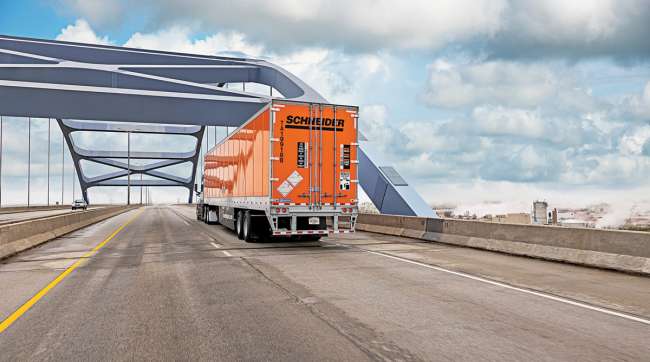Staff Reporter
Schneider Q3 Revenue, Profit Decline in Weak Freight Market

[Stay on top of transportation news: Get TTNews in your inbox.]
Schneider experienced a slight decline in profit and revenue during the third quarter of 2024 amid ongoing efforts aimed at weathering the challenging freight market, the company reported Nov. 6.
The Green Bay, Wis.-based truckload motor carrier posted net income of $30.6 million, or 17 cents a diluted share, for the three months ending Sept. 30. That compared with $35.6 million, or 20 cents, during the same time the previous year. Total revenue decreased by 3% to $1.32 billion from $1.35 billion.
The results missed expectations from investment analysts on Wall Street, who had been looking for EPS of 23 cents per share and quarterly revenue of $1.33 billion, according to Zacks Consensus Estimate.
“Last quarter we outlined a framework designed to drive ongoing structural improvements in our business, deliver increased enterprise value and allow us to seize the opportunities ahead, enhancing financial returns as the freight market recovers,” Schneider CEO Mark Rourke said during a call with investors. “In the third quarter, the market continued its path towards recovery, with seasonality becoming more prevalent, but on trend, not yet proven.”
Rourke said the company’s plan is aimed at managing the freight allocation process with purpose and discipline, and to optimize capital allocation across strategic growth drivers.
“When we updated our expectations for the second half of 2024 on our last earnings call, we had experienced a solid quarter end in June from the traditional seasonality standpoint, and our visibility into July, at that time, suggested more of the same,” Rourke said. “However, the improved seasonality trends did not sustain mid-August through quarter end, and were further impacted by the hurricanes and East Coast port strike in the short term.”
Rourke noted, however, that contract pricing across the company’s network continued its positive momentum from the beginning of the year.
“Despite the current freight environment, we are not waiting for the market correction to improve results,” Rourke said. “In addition to our cost reduction and productivity actions, there are two other primary focus areas that will drive an improvement in truckload network result. The first action is rate restoration, where we remain disciplined. At the end of September, we were 85% through our network contract renewals, with third quarter renewal rate improvements in the mid-single digit percentage range. As customers seek to prepare for a market correction and move to asset-based carriers, we anticipate growth opportunities, which in turn creates the ability to address the lowest performing freight in our network.
McLeod Software CEO Tom McLeod explores the potential for artificial intelligence to boost efficiency and build resilience. Tune in above or by going to RoadSigns.ttnews.com.
“The second self-help opportunity for the truckload network is to grow our owner-operator fleet,” Rourke said. “Though we have seen a number of owner-operators shrinking for Schneider, and in the industry, we believe we have an opportunity to change that trajectory. We have recently launched Schneider’s FreightPower for owner-operators, an updated consumer grade platform that now provides owner-operators visibility to more freight opportunities across the Schneider portfolio of services. FreightPower provides business owners increased choice and timesaving features while delivering a higher level of service to customers, especially in brokerage.”
Schneider ranks No. 9 on the Transport Topics Top 100 list of the largest for-hire carriers in North America and No. 21 on the TT Top 100 largest logistics companies list.
Truckload segment revenue decreased 1% to $532.2 million from $535.3 million during the same time last year. This was due to lower network volumes that were partially offset by growth in dedicated operations. Truckload revenue per truck per week increased 2% to $3,971. Both dedicated and network revenue per truck per week increased year over year. Income from operations decreased 3% to $23.7 million from $24.5 million.
Want more news? Listen to today's daily briefing above or go here for more info
Intermodal segment revenue increased 1% to $264.7 million from $263 million last year. This was primarily due to enhanced network optimization, improved dray productivity and ongoing cost management actions that helped achieve margin growth. Revenue per order increased slightly due to changes in freight mix, which impacted length of haul. Income from operations increased 41% to $15.7 million from $11.1 million.
“Earnings improved sequentially and grew over 40% compared to last year, mostly through execution and structural internal cost improvement actions,” Rourke said of the segment. “All of our intermodal book has gone through the annual renewal process. Third quarter win rates and incumbent lane retention outcomes improved from the second quarter renewal season as we maintain pricing discipline in a highly competitive environment.”
Logistics segment revenue decreased 4% to $313.7 million from $326 million, due primarily to lower brokerage revenue per order. Brokerage volumes were also down 1% year over year. Income from operations decreased 11% to $7.6 million from $8.5 million.





